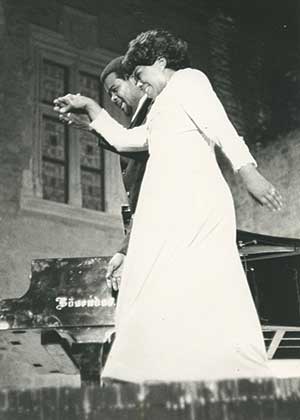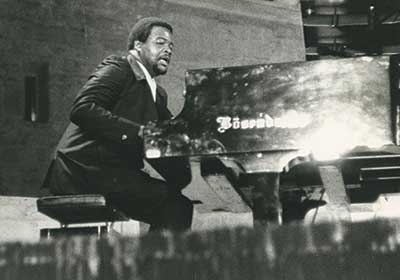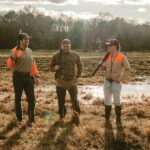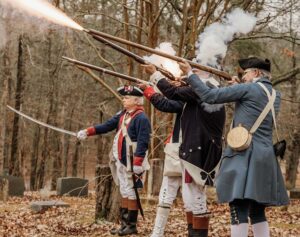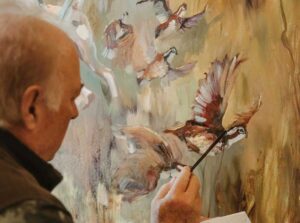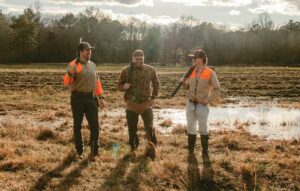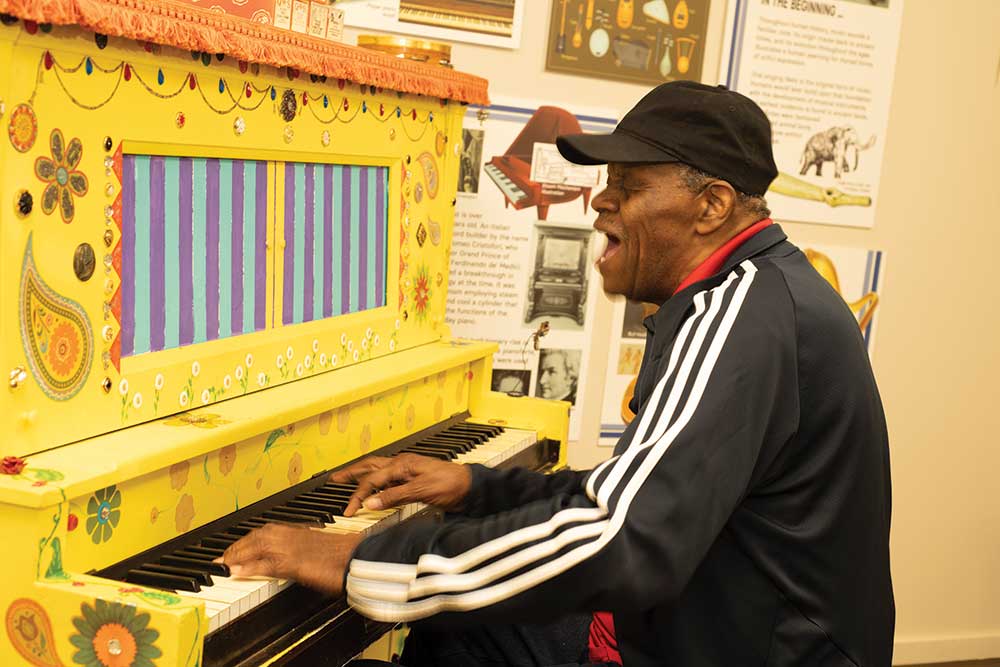
Born to play the piano … and sing
Story by Joe Whitten
Photos by Wallace Bromberg Jr. and Submitted Photos
In the words of American Bandstand’s Dick Clark, “Music is the soundtrack of your life,” and that fits Pell City musician Floyd Waites like a well-tailored 5th Avenue tuxedo.
Born to Edmond and Beatrice Waites in the Glenn City area of Pell City, Floyd was the youngest of their five children – three boys and two girls. This was a loving family overseen by Mrs. Waites after Mr. Waites became an invalid from a stroke.
By his teenage years, Floyd’s siblings had left home, so his mother depended upon him with chores and cleaning. “I was always singing when I was helping around the house,” he recalled. He heard the music coming from the radio, and he knew in his heart that if he had a piano, he could play those songs.
“I went to my mother and said, ‘I want to get a piano.’” He smiled as he told her reply. “She said, ‘Floyd, I can’t get no piano!’ She wasn’t able to buy a piano. But a few months after that, I began to get a small check from Avondale Mills because my daddy had worked there before his stroke.”
With that income, another plan took shape. “I told my mom that I was gonna try to get a piano (with that money),” he reminisced. “There was a piano company in Anniston, Alabama, called Forbes Piano Company. So, someone carried me there, and I looked around and spoke to the man in charge, and he said, ‘I can let you have it for so much,’ – whatever it was priced at that time. And I said, ‘Well, how much will that be a month?’ He told me what it would be and said, ‘Could you pay ten dollars a month?’ And I said, ‘Oh, I can pay ten dollars a month!’ And, so, they brought the piano out to our house.”
Oh, happy day! Now, with the radio on, Floyd could sit at the treasured piano, with his fingertips eagerly searching out the notes and chords and runs of what he heard. He was a natural – born for the piano and music.
He must have played too much Fats Domino or Chubby Checker, because one day his mother said, “Floyd, I don’t want you playing just anything and everything. You’ve got to play for the Lord.” He chuckled at the memory. “I said, ‘Oh, yes, Mama, that’s what I plan to do.”
And he did just that, beginning at Rocky Zion Missionary Baptist Church under the guidance of Rev. Silas Woods, who encouraged him in his playing for the Lord.
Floyd enjoys recalling those early years with Rev. Woods. “We had a Sunday for the young group to sing, and I began playing for them – songs that I knew and could catch onto. Rev. Woods liked for the Junior Choir to go with him when he preached at other churches. And I would go with them and play piano. I was encouraged a lot by Rev. Woods.”
In the spring of 1965, Floyd graduated from St. Clair County Training School, began looking for work and found scant possibilities locally. The Waites’ across-the-road neighbors had moved to New York City, and they encouraged him to come live with them. “You could get a job up here in New York,” they told him. “We could take you to the state unemployment agency, and they will find you a job.” Therefore, with hope in his heart, Floyd boarded a Greyhound bus and headed to the Big Apple – without a clue as to the places God and his piano would take him in the years ahead.
His friends met him at the bus station, took him to their home, and gave him a room until he could find work and rent an apartment of his own.
At the New York Unemployment Office, the interviewer asked him what kind of work he was interested in. and he told them he was a church musician. “They went into the back,” Floyd laughed, “and came back with a uniform, a khaki uniform, and they said, ‘This will fit you very good.’ And I said, ‘What’s that for?’ And they said, ‘This is for you to become a New York City police officer.’ And I said, ‘Oh, no! My Lord, no! That won’t work! I don’t think I could handle anything like that! Don’t you think you could find me something else?’”
So, they sent him to another section where he had a more favorable offer. The lady interviewing him said, “Mr. Waites, we have an opening for a job in the Bronx at a school, and it’s dealing with food service.” This interested him, and the lady’s next question raised his spirits higher, “Can you cook?” Floyd, feeling almost back home in Pell City, replied, “Honey, that’s right down my alley!”
Then she told of a position at the Walton High School, and Floyd said, “I would love to do that because that’s what I studied in school.” He was referring to the St. Clair County Training School where he was more interested in cooking than in farming and had taken Home Economics rather than Vocational Agriculture.
Following the lady’s instructions, he went to Walton High School Monday morning, and after being interviewed there, he was hired. The school system sent him to various training sessions that prepared him for a career in New York City school food services – the job he worked until he retired.
Music opportunities in New York City’s Harlem seemed to find Floyd without his looking for them. The leader of the Jimmy Smith Singers came up to him and asked him if he could sing.
“Oh, yeah, I sing,” Floyd replied, adding, “I’ve got a friend who sings, too.”
“Bring him along,” the leader told him. The friend was one he grew up with in Pell City, and he and Floyd had connected again in New York. The two young men rehearsed and sang with the Jimmy Smith Singers for a while.
“But it was still like something was missing,” he said. His mama’s words, “You’re not gonna play just anything and everything” no doubt hummed in his mind along with sacred memories of Rocky Zion and Rev. Woods.
“The pianist for the Jimmy Smith Singers was playing for a church in my Harlem neighborhood, and he said to me, ‘Floyd, why don’t you come to my church? I play up here at The Gates of Prayer Church. There’s a lady that’s pastor of the church, and her name is Prophetess Dolly Lewis.’ I said, ‘I don’t live too far from there. Maybe I’ll come one Sunday.’”
Not too long after that invitation, Floyd attended The Gates of Prayer Church, and there, by God’s providence, he found his spiritual calling.
Living close to the church, he walked to the service, and as he got closer to the sanctuary, the organ’s chords and crescendos urged him onward. He opened the church door and looking up to the pulpit, he saw a woman dressed in gleaming white looking out over the assembling congregation – Prophetess Dolly Lewis.
Floyd remembers the day. “She looked directly at me and says, ‘Come on in. Go over there and sit down at the piano.’ I must have looked funny, because she said, ‘Yeah, you can play, and you can sing.’ Now, nobody in New York had heard me play, and I wondered, ‘How did this lady know this?’ But I never did ask her.”
From that Sunday, Floyd played piano and sang at The Gates of Prayer Church under the guidance of Prophetess Lewis.
When she went to other cities, he traveled with her to play piano at her preaching services. For one who had never flown, an added excitement was flying to and from these destinations. On these trips, she also held private sessions in her hotel room, and people would be lined up to get messages from her. “A word from the Lord” in today’s Pentecostal parlance.
Prophetess Lewis introduced Floyd to two famous gospel singers – Marie Knight and Sister Rosetta Tharpe. He enjoys recalling those singers. “One Sunday, this lady walked into the church, and everybody looked around. Prophetess Lewis looked at the newcomer and said, ‘Come on up, Marie Knight.’ She was a professional singer, and she would travel all around with this other lady, Sister Rosetta Tharpe. Rosetta was an electric guitar player.” He paused, smiling, “Oh, she could lean back on that guitar and play.”
Godmother of Rock ‘N Roll
Rosetta Tharpe was born in Cotton Plant, Arkansas, in 1915 to Katie Bell and Willis Atkins. Katie Bell played the mandolin, sang, and preached as a Pentecostal evangelist, according to the online Encyclopedia Britanica. She began playing guitar at age four and at age six she traveled and sang with her mother.
After moving to Chicago, she developed her own guitar style under the influence of Chicago’s blues and jazz musicians. When she moved to New York City in the 1930s, “…She sang traditional gospel songs with contemporary jazz tempos that she played on her electric guitar. With these performances, she introduced gospel into nightclubs and concert venues. Her work influenced early rock and rollers such as Chuck Berry, Jerry Lee Lewis, Little Richard and Elvis Presley.” She came to be called the “Godmother of Rock and Roll” and was inducted into the Rock and Roll Hall of Fame in 2018.
The ‘Voice’
Marie Knight, born in Florida in 1920 or 1925, depending on the source, grew up in Newark, New Jersey. According to the online African American Registry (AAREG), Marie started touring in 1939. Sometime in the 1940s, she performed at the Golden Gate Auditorium in Harlem along with Mahalia Jackson.
Sister Rosetta Tharpe attended that concert and “…recognized something special in Marie’s contralto voice.” Rosetta invited Marie to tour with her, and they performed as a team for several years. Sister Rosetta and Marie’s 1947 recording of Up above My Head There’s Music in the Air reached number 6 on the Billboard chart in 1948. Marie sang both Gospel and Rock and Roll, but in her later years sang only Gospel.
When Marie Knight moved back to New York City, she began attending Dolly Lewis’ Gates of Prayer Church, where she organized the choir. Floyd was the pianist and his friend from Pell city the organist. “So, we started playing for Marie,” Floyd smiled. “I’ve got albums that I’m playing for Marie.” He lowered his voice to a baritone before saying, “She had a voice!”
When Marie began planning another tour, she came to Floyd and said, “How would you like to travel to Europe with me?” Floyd laughs as he tells it. “I said, ‘Oh, I don’t know about that!’ ‘Well, you’re gonna get paid,’ she told me. So, I said, ‘We’ll have to ask Mama.’ That’s what we called Pastor Dolly Lewis.”
Floyd asked Lewis’ advice, and after consideration, she agreed for him to travel with Marie, and assured him, “I’m gonna make sure she pays you, cause she’s kind of close with money.”
Floyd flew with Marie Knight and her entourage to Paris. Landing at the Charles De Gaulle Airport, they were met with the concert tour officials who took them to their lodgings for the night. From Paris they traveled to a city in southern France, whose name Floyd could not recall. From that city, Marie, accompanied by Floyd at the piano, gave concerts in various locations.
Then, it was on to San Sebastian, Spain, for the concluding few weeks of Marie’s tour. Then back to New York City.
“From that day,” Floyd recalls with pleasure, “Marie was happy to have me with her. But she paid,” he laughed. “Those hundred-dollar bills smelled good! And I kept on playing for her.”
Floyd met his future wife, Evelyn Keith, at Gates of Prayer Church. Evelyn grew up in Childersburg, so they had mutual connections back home. She was a singer, so she and Floyd sang together at whichever church he played for. They had one son, Kenny.
Floyd continued playing piano for Prophetess Dolly Lewis at Gates of Prayer Church until she died. When Lewis died, Marie Knight – now singing only Gospel – became pastor of Gates of Prayer. Floyd played piano at the church until Marie died in 2009 from pneumonia complications.
The Waites were on vacation in Alabama when Marie passed, Floyd relates. “They got in contact with me while my wife and I were down here on vacation, and we rushed back to New York.” When asked if he played piano for her service, Floyd responded, “I didn’t do too much playing, but I did sing some of the songs that she had sung, and I had played for her down through the years.”
Floyd also directed the choir in singing one of Marie’s best known Gospel recordings, Didn’t It Rain.
Dual roles
Most of the years that Floyd played piano at Gates of Prayer, he also played for another nearby church, Greater Hood Memorial AME Zion Church. “I was playing at Hood Memorial all along, because it was on a different time schedule for that church … And it was just around the corner from Gates of Prayer. I played the piano for them for years. And I played organ for them, too, because I had gotten into playing the organ. I played for the choirs – they had a nice senior choir that sang anthems,” Floyd paused, then added, “It was a fairly big church.”
Greater Hood Memorial is historic in Black churches in America. Established in 1824 as Harlem AME Zion, this oldest Black church in Harlem has survived economic downturns (the Great Depression put them in dire financial circumstances), several relocations and a few name changes. But it has survived with Sunday services continuing for 200 years.
Having reached retirement age, Floyd supervised his last school lunch, played his last Sunday service in Harlem, packed his belongings and returned to the place called home, Pell City, Alabama.
Floyd relates how he and Evelyn came to Pell City every year for the month of August to visit relatives and churches in the area. They always visited Coosa Valley Baptist Church in Vincent where Rev. Willie Joe Posey was pastor.
“He would always tell me, when me and my wife would come down from New York, ‘Floyd, come on up here and sing, you and your wife,’ and we’d go up and sing for him. And he’d say, ‘Y’all see that man there? If he ever decides to come outta New York City, I want him right there,’ and he’d point to the piano.”
Today, Floyd is the full-time pianist at Coosa Valley Baptist where Rev. Posey still pastors. However, he ministers alone, for Evelyn died while they were living in New York. “I’ve been with Rev. Posey ever since I came back home to live,” Floyd muses quietly.
“I don’t charge them at the church, but Rev. Posey told me, ‘Oh no, you have to accept something, because people know how good you play and sing, they gonna take you away from us. The church will have to give you something. We don’t want you to leave us.’ So, I said, ‘Well, just sometime give me a love offering, but I don’t expect to be on salary. I don’t charge anything.’ So, every third Sunday, they give me a love offering, and I accept it.”
Rev. Posey has pastored the church for 48 years, and speaks highly of Floyd. “He has proven himself a believer in God and Christ. He’s a faithful man. He’s true to his word. … When he was in New York, I told him when he moved back here, he had a place (at our church), and he’s been with me.” Rev. Posey also noted the beautiful vocal harmony when Floyd and Evelyn sang together at the church.
In the community, Floyd is frequently asked to play for revivals, funerals and special events. At the 2024 Black History event at the Pell City Museum, he was one of the featured musicians of the day.
Many in the community call him “Uncle Floyd,” as did Amelia Beavers when she was asked for a comment. “There are so many things that I could say about Uncle Floyd, but the best thing is that he loves the Lord, and he loves people. He helps throughout his community any way that he can.
“If a loved one dies, he is willing to come to play and sing for the family. He has been a jewel of a friend coming back home to live. He is a beautiful asset to our community. I pray for him many years of serving the Lord and his community. All you have to do is ask and if he does not have another engagement, he is more than willing to accommodate.”
Floyd and Evelyn’s son, Kenny, lives in Childersburg, so Floyd is active in his life and the lives of his four grandchildren – two girls and two boys.
How would he like to be remembered? “I’d just like to be remembered as using the gifts that the Lord has given to me. If I was called to do something, it wasn’t for reimbursement. I thank God for the gift, and I thank Him that He allowed me to use it … It’s a gift that He has given, and I just want to give back.”
As a child and as an adolescent in Pell City, music captivated Floyd Waites and has held him fast all his years. One of the songs he played for Marie Knight was the traditional song Up Above My Head, and the lyrics are true for Floyd –
Up above my head, there’s music in the air
Up above my head there’s music in the air,
Up above my head there’s music in the air,
And I really do know,
Yes I really do know,
There’s a heaven somewhere.
So, Floyd Waites, keep on playing and singing “for the Lord” and sharing your God-given gifts, for without a doubt, you enrich the music life of Pell City and St. Clair County. l











